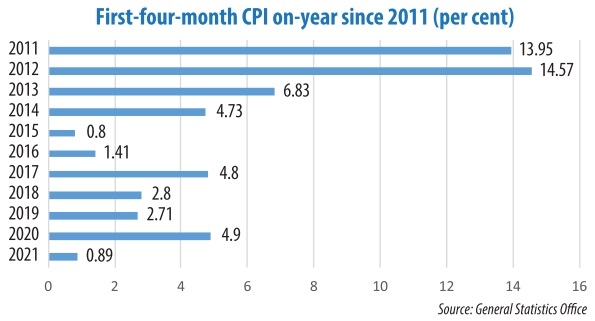Keeping inflation in the sweet spot
 |
According to the General Statistics Office (GSO), the Vietnamese government has so far succeeded in reining in inflation and this effort is expected to continue until the year’s end as domestic consumption remains feeble due to negative impacts of the global health crisis.
In the first four months of this year, the consumer price index (CPI) increased 0.89 per cent on-year, also the lowest rise in the first four months since 2016. Specifically, the first-four-month rate was 1.41 per cent in 2016, 4.8 per cent in 2017, 2.8 per cent in 2018, 2.71 per cent in 2019, and 4.9 per cent in 2020.
In the first four months of this year, though there has been a rise in prices of some items used to calculated CPI in Vietnam, such as foodstuffs (0.2 per cent on-year), catering services (2.07 per cent), gas (14.69 per cent), and petrol (2.49 per cent), such a price hike was small as compared to the same period last year, when COVID-19 began to attack the economy.
The period saw total retail and consumption service revenues hit nearly VND1.7 quadrillion ($73.9 billion), up 10 per cent over the same period last year when the rate declined 2.8 per cent on-year.
“Despite a rise in local consumption, it remains weak and has yet to fully recover, and this has failed to significantly increase the first-four-month CPI,” said a GSO expert. “There have also been some major causes behind such an on-year reduction.”
Since last year the government has been deploying support solutions for individuals and enterprises hit by COVID-19. For example, state-owned Electricity of Vietnam (EVN) has reduced power prices for its customers. The average electricity price in the first four months of 2021 fell 5.88 per cent on-year, leading to a 0.19 per cent reduction in CPI.
However, despite the move, EVN has reported that all of its activities increased on-year in the first quarter of 2021.The group’s total gross industrial output is estimated to be VND52.83 trillion ($2.3 billion), up 3.18 per cent on-year.
Commercial electricity totalled 50.79 million kilowatt hours, up 3.18 per cent. In which, electricity for agro-forestry-fishery accounts for 3.97 per cent of total electricity consumed, while the rate is 56.01 per cent for construction and industrial activities and 31.46 per cent for households – all up against the same period last year. Notably, EVN’s total revenue from power sales is estimated to be over VND94 trillion (over $4 billion), up 4.11 per cent on-year.
Another cause behind a reduction in first-four-month CPI in Vietnam is that state-owned Vietnam Railways Corporation, airlines, and travel firms have launched price discounts to stimulate travelling and tourism activities. For example, the ticket price for trains since early this year has decreased on average 7.4 per cent on-year, while the air ticket price has also dropped 17.4 per cent on-year, and full-package tours’ average price has also followed suit, at 3.32 per cent on-year.
The Asian Development Bank (ADB) has praised Vietnam’s efforts to control inflation, saying that in the first quarter of 2021 it slid to its lowest level since 2016 due to lower transport costs and subdued demand. “But rising international oil prices on the back of global economic recovery and increased domestic consumption are expected to edge inflation up to 3.8 per cent this year and 4 per cent in 2022,” read an ADB report on Vietnam’s economic outlook.
The International Monetary Fund (IMF) also forecast that the inflation for 2021 in Vietnam may be only 2.4 per cent.
“Inflation continued to be well contained at 3.23 per cent, below the authorities’ target of 4 per cent in 2020,” said an IMF report also on Vietnam’s economic prospects. “Authorities have set the targets for GDP growth of 6.5 per cent and inflation at around 4 per cent in 2021 in line with the goals set in the national Socioeconomic Development Strategy for 2021-2030.”
What the stars mean:
★ Poor ★ ★ Promising ★★★ Good ★★★★ Very good ★★★★★ Exceptional
 Tag:
Tag:
Related Contents
Latest News
More News
- Ho Chi Minh City launches plan for innovation and digital transformation (February 25, 2026 | 09:00)
- Vietnam sets ambitious dairy growth targets (February 24, 2026 | 18:00)
- Masan Consumer names new deputy CEO to drive foods and beverages growth (February 23, 2026 | 20:52)
- Myriad risks ahead, but ones Vietnam can confront (February 20, 2026 | 15:02)
- Vietnam making the leap into AI and semiconductors (February 20, 2026 | 09:37)
- Funding must be activated for semiconductor success (February 20, 2026 | 09:20)
- Resilience as new benchmark for smarter infrastructure (February 19, 2026 | 20:35)
- A golden time to shine within ASEAN (February 19, 2026 | 20:22)
- Vietnam’s pivotal year for advancing sustainability (February 19, 2026 | 08:44)
- Strengthening the core role of industry and trade (February 19, 2026 | 08:35)






















 Mobile Version
Mobile Version